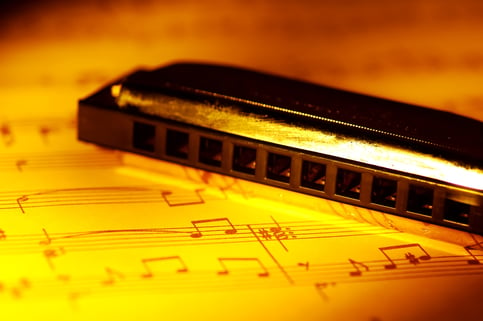
Avant-garde jazz saxophonist, singer, and composer, Albert Ayler said, “Music is the healing force of the universe.” It turns out that music isn’t just good for healing broken hearts; it can assist in achieving better outcomes for those with chronic obstructive pulmonary disease, more commonly known as COPD.
The Study
A study reported in Respiratory Medicine Journal gathered together 68 COPD patients between the ages of 48 to 88. These test subjects were diagnosed with moderate to severe COPD. This study introduced music therapy into traditional pulmonary rehab to judge its effect on mental outlook, quality of life, and respiratory symptoms.
between the ages of 48 to 88. These test subjects were diagnosed with moderate to severe COPD. This study introduced music therapy into traditional pulmonary rehab to judge its effect on mental outlook, quality of life, and respiratory symptoms.
Patients attended weekly music therapy sessions for six weeks at the Louis Armstrong Center for Music and Medicine at MSBI. These sessions included live music, singing, creative imagery, and wind instrument playing.
Breath control techniques and diaphragm exercises were incorporated with vocal performance and instrument playing. Therapy sessions were directed by certified music therapists who encouraged participants to choose their own music which encourages self-expression fostering more engagement in therapeutic activities. Patients were given weekly questionnaires in several categories:
- Dyspnea, or breathlessness
- Depression and overall mood
- Respiratory control
- Fatigue
Results
After analyzing the questionnaires and performing lung function testing, researchers found improvement in all areas. Patients reported feeling more optimistic and happier in general. With improved mood came more energy and decreased fatigue. They were also found to have better diaphragm and breath control. Feelings of breathlessness were reported to have subsided. Based on this evidence researchers concluded that standard pulmonary therapy conducted in concert with music therapy may prove to be effective in improving treatment of COPD as well as other pulmonary diseases.
How Music Therapy Helps
Those battling COPD experience shortness of breath as well as chronic coughing, and 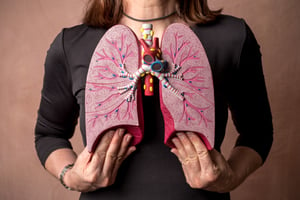 wheezing. Patients come down with colds more often than the average person and sometimes experience great chest discomfort. Dealing with these symptoms compounded with greater fatigue often causes patients to isolate themselves. Many are faced with not being able to afford adequate rehabilitation programs or don’t adhere to proper treatment regimens.
wheezing. Patients come down with colds more often than the average person and sometimes experience great chest discomfort. Dealing with these symptoms compounded with greater fatigue often causes patients to isolate themselves. Many are faced with not being able to afford adequate rehabilitation programs or don’t adhere to proper treatment regimens.
As these musical therapy programs didn’t include expensive medications they are easy to afford. Instruments can be rented for a low cost or purchased at a discount at a pawnshop or through local or online classified ads. Those who didn’t want to play instruments were introduced to vocal training.
Singing and your Lungs
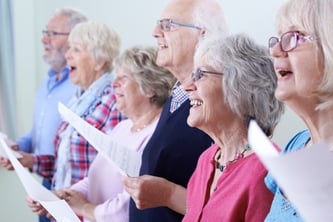
Singing is thought to help expand the lungs and improve elasticity. Patients learn to control their breathing and perform it in a more relaxed way thereby improving their ability to stave off exacerbation. Many people think that respiratory patients have trouble inhaling enough air however the reverse is true. With decreased lung function, patients don’t fully exhale the carbon dioxide the lungs have filtered out so there is limited space to inhale fresh air thus compromising oxygen saturation.
A long-term study on the effects of music therapy was conducted at Canterbury Christ Church University in Kent. Initially participants sang for an hour a week over a 12 week period. At the end of this time patients had their breathing assessed using a spirometer. Measurements showed lung function that was either maintained or improved and disease progression was halted. Further assessment after 5 months showed that lung function improved dramatically with most patients showing greater lung capacity than they possessed at the beginning of the study.
When singing, patients exhale in a controlled manner which lessens anxiety. They must then inhale more fully in order to have enough air to perform. This helps lungs to operate more efficiently and helps with their function overall. Patients also reported that singing lifted their spirits, helped them feel more relaxed, and reduced anxiety and depression. I think we can all attest to the fact that whether you’ve sung up on a stage or not, belting out a tune with the car radio cranked up or in the shower is just plain fun!
Proper posture is another key component to being able to sing effectively. Good posture opens up your chest cavity lessening resistance as your lungs try to expand and contract in the act of breathing. By extending breathing through singing all the muscles involved in breathing are strengthened, including the diaphragm.
Benefits of Playing an instrument
The act of listening to music has proven to be extremely beneficial to cognitive function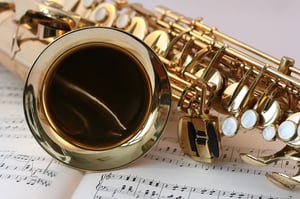 and development. It’s becoming increasingly common for music therapy to be used in the treatment of Alzheimer’s and dementia. It greatly decreases mental stress and in some cases can bring back some memory function.
and development. It’s becoming increasingly common for music therapy to be used in the treatment of Alzheimer’s and dementia. It greatly decreases mental stress and in some cases can bring back some memory function.
The act of playing an instrument is thought to have the ability to prevent dementia and keep mental illness at bay. To read notes and have the brain translate that into muscle memory movements to play an instrument is a very sophisticated sensory process. It strengthens the communication between different quadrants of the brain.
Learning to play a wind instrument has added benefits for respiratory patients. Like singing it requires learning breath control techniques. The lungs themselves are not muscles so you cannot strengthen them by exercising but you can strengthen the muscles that assist the lungs in breathing. The main benefits to lungs themselves is the maintenance and in some cases, improvement of elasticity.
Picking an Instrument
Bigger instruments are obviously more challenging for respiratory patients to play. It’s best to start small and move up. You may have to work up to some of the more challenging instruments.
Require Less Lung Capacity
- Recorder
- Flute
- Piccolo
- Harmonica
Require More Lung Capacity
- Saxophone
- Clarinet
- Trumpet
- Trombone
Participating Without a Formal Musical Therapist
To best way get the maximum benefit from this or any kind of therapy is to do it with a certified therapist. However, this form of therapy may not be readily available in all areas. If this is the case for you don’t worry! Music is everywhere!
Regular singing practice may be found for little or no cost to you! It will help you with your breathing and you’ll have a group of new friends as well.
- Join your church choir
- Form your own quartet or music group
- Google choral groups in your area
- Ask your local rec center if they have singing clubs or lessons
- Find a vocal coach
- Your local community college may offer singing lessons
- Ask your respiratory therapist for recommendations or suggest they add this to their treatment program
- Udemy offers singing lessons
- There are several vocal exercise videos on YouTube
Playing an Instrument
Purchasing an instrument can be expensive especially if you aren’t sure if playing it is going to be possible or enjoyable for you so it’s best to rent or borrow initially. Some instruments, such as harmonicas or recorders can be purchased for less than 20 dollars and can be just as effective for breathing exercises. If you are going to be taking formal lessons either with a musical therapist or music teacher they may have some advice for you.
- You may consider purchasing a used instrument from Craigslist or other classified source.
- Post on social media and see if any of your friends might have an instrument they would be willing to let you borrow.
- Try your local pawn shop, the often have a variety if instruments for sale.
See if it’s for You
If you want to give this type of therapy a try to see if it helps your breathing we recommend starting with a harmonica. They are easy to get, inexpensive, portable, easy to learn, and most important, fun!
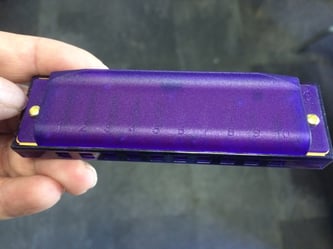
The holes on beginning harmonicas are often numbered as you can see in this photo. If you Google, “Harmonica Tabs” you will find songs that you can play but either blowing out or drawing air back through these numbered holes. These tabs will tell you which number to play and if you should be blowing air out or inhaling air back through.
We've collected a few songs here for you to practice. In some tab arrangements you will see numbers with a minus sign near them. This means that you will draw air through that number hole. The numbers without the minus sign mean that you should blow air through. In our case we have color coded it so that it's easier to see as you're learning. So for blue numbers, blow air through the hole. For red numbers, draw air in through the hole.
Oh Susanna
4 4 5 6 6 6 6 5 4 5 5 4 4 4
Oh I've come from Alabama with my ban-jo on my knee
4 4 5 6 6 6 6 5 4 5 5 4 4 4
And I'm goin' to Loui - si - an - a my true love for to see
5 5 6 6 6 6 6 5 4 4
Oh Su - san - a now don't you cry for me
4 4 5 6 6 6 6 5 4 5 5 4 4 4
Oh I've come from Al - abam - a with a ban - jo on my knee
My Country Tis of Thee
4 4 4 3 4 4 5 5 5 5 4 4 4 4 3 4
My country 'tis of thee, Sweet land of li - ber - ty of thee I sing
6 6 6 6 5 5 5 5 5 5 5 4
Land where my fathers died. Land of the pilgrim's pride
5 5 5 4 4 5 5 6 6 5 5 4 4
From e - v - er - y mountain side. Let free - dom ring.
Swing Low Sweet Chariot
3 3 3 3 2 1 3 3 3 3 3 4 5 4
Swing low sweet cha - r - i - ot com - in' for to car - ry me home
5 4 3 4 3 3 2 1 3 3 3 3 3 3 2 3
Sw - ing low sweet ch - a - riot comin' for to car - ry me home
3 4 3 2 3 3 2 3 3 3 2 1 3 3 3 3 3 4 5 4
I look ov - er Jor - dan and what did I se - e comin' for to carry me home
4 5 4 3 3 3 3 3 3 3 2 1 3 3 3 3 3 3 2 3
A ba - nd of an - gels com - in' after m - e, comin' for to car - ry me home
SEND US A VIDEO!!!!
If you want to showcase your musical talent and tell us how you feel it's helped your respiratory condition, we'd love to hear from you! Send videos to my email at lburkhart@1stclassmedical.net or upload them to our Facebook Page.



 between the ages of 48 to 88. These test subjects were diagnosed with moderate to severe COPD. This study introduced music therapy into traditional pulmonary rehab to judge its effect on mental outlook, quality of life, and respiratory symptoms.
between the ages of 48 to 88. These test subjects were diagnosed with moderate to severe COPD. This study introduced music therapy into traditional pulmonary rehab to judge its effect on mental outlook, quality of life, and respiratory symptoms.
 wheezing. Patients come down with colds more often than the average person and sometimes experience great chest discomfort. Dealing with these symptoms compounded with greater fatigue often causes patients to isolate themselves. Many are faced with not being able to afford adequate rehabilitation programs or don’t adhere to proper treatment regimens.
wheezing. Patients come down with colds more often than the average person and sometimes experience great chest discomfort. Dealing with these symptoms compounded with greater fatigue often causes patients to isolate themselves. Many are faced with not being able to afford adequate rehabilitation programs or don’t adhere to proper treatment regimens.
 and development. It’s becoming increasingly common for music therapy to be used in the treatment of Alzheimer’s and dementia. It greatly decreases mental stress and in some cases can bring back some memory function.
and development. It’s becoming increasingly common for music therapy to be used in the treatment of Alzheimer’s and dementia. It greatly decreases mental stress and in some cases can bring back some memory function.
